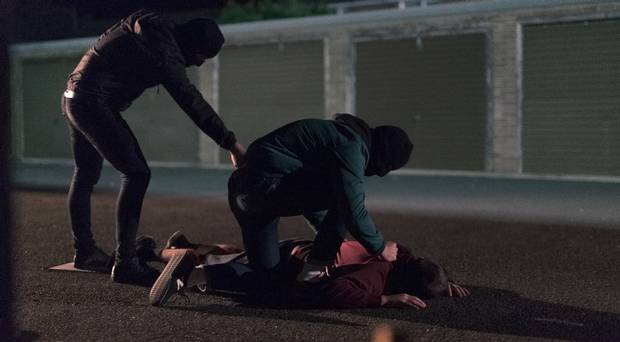 PEOPLE who place their trust in paramilitaries over the police have been warned that “they don’t offer their services for free”, says a Derry politician.
PEOPLE who place their trust in paramilitaries over the police have been warned that “they don’t offer their services for free”, says a Derry politician.
A new survey commissioned by the Department of Justice found that around one in ten in loyalist or republican areas claimed paramilitaries made them feel safer.
Foyle SDLP MLA Mark H Durkan said the groups should be called out as gangsters who exploited their communities.
The Perceptions of Paramilitarism in Northern Ireland is the first in-depth survey of attitudes towards terror groups here.
It showed 10% of those in loyalist areas and 11% in republican areas felt paramilitaries kept them safe, compared to 5% across Northern Ireland as a whole.
In January the UVF was linked to the murder of east Belfast loyalist Ian Ogle, and the New IRA set off a car bomb in Derry.
Paramilitaries have also been responsible for 94 so-called punishment attacks in 2016/17, and are making 300 people homeless each year due to intimidation.
Mr Durkan said: “We talk about paramilitary organisations, but we’re really talking about gangsters.
“That’s how we should start describing them; they claim to protect the community but in many cases they exploit them.
“They don’t offer their services for free.
“Someone might think they did them a good turn, but one day a knock will come to the door to have the favour returned.”
He added frustration over delays in the justice system and paramilitaries creating “no go” areas for police was prolonging the problem.
“You also have more and more disaffected young people, failed by society, so when they are offered a chance of belonging to something they can be easily led and manipulated,” he said.
Some 81% of people disagreed that they kept areas safe.
Almost a third (32%) of those who live in loyalist areas felt paramilitaries had a controlling influence, with 24% in republican areas feeling the same, compared with 14% across the province.
And 29% of those living in loyalist areas and 24% living in republican areas think that paramilitaries create fear and intimidation, compared with 15% generally.
The Department of Justice is leading a programme agreed by the former Executive to tackle the problem.
Some £50m has been pledged between 2016-21 to address aramilitarism, criminality and organised crime. The Paramilitary Crime Task Force has seen the PSNI work with Revenue and Customs and the National Crime Agency.
Anthony Harbinson of Tackling Paramilitarism said the report would increase understanding of the impact of such activity.
He added: “Most people do feel safe living in their areas and feel protected by the law and justice system, but there are some parts of Northern Ireland where this is a real challenge and it is important to recognise and address this.
“The Tackling Paramilitarism programme is aimed at ensuring we can all live in a society where citizens and communities feel safe and confident, where the public support and have increasing confidence in the justice system and where paramilitarism has no place.”
Tags:




